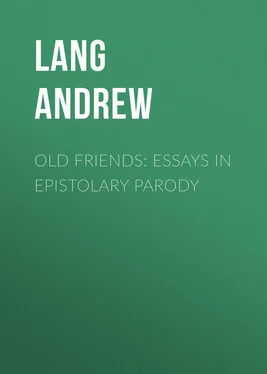Andrew Lang - Old Friends - Essays in Epistolary Parody
Здесь есть возможность читать онлайн «Andrew Lang - Old Friends - Essays in Epistolary Parody» — ознакомительный отрывок электронной книги совершенно бесплатно, а после прочтения отрывка купить полную версию. В некоторых случаях можно слушать аудио, скачать через торрент в формате fb2 и присутствует краткое содержание. Жанр: foreign_antique, foreign_prose, на английском языке. Описание произведения, (предисловие) а так же отзывы посетителей доступны на портале библиотеки ЛибКат.
- Название:Old Friends: Essays in Epistolary Parody
- Автор:
- Жанр:
- Год:неизвестен
- ISBN:нет данных
- Рейтинг книги:4 / 5. Голосов: 1
-
Избранное:Добавить в избранное
- Отзывы:
-
Ваша оценка:
- 80
- 1
- 2
- 3
- 4
- 5
Old Friends: Essays in Epistolary Parody: краткое содержание, описание и аннотация
Предлагаем к чтению аннотацию, описание, краткое содержание или предисловие (зависит от того, что написал сам автор книги «Old Friends: Essays in Epistolary Parody»). Если вы не нашли необходимую информацию о книге — напишите в комментариях, мы постараемся отыскать её.
Old Friends: Essays in Epistolary Parody — читать онлайн ознакомительный отрывок
Ниже представлен текст книги, разбитый по страницам. Система сохранения места последней прочитанной страницы, позволяет с удобством читать онлайн бесплатно книгу «Old Friends: Essays in Epistolary Parody», без необходимости каждый раз заново искать на чём Вы остановились. Поставьте закладку, и сможете в любой момент перейти на страницу, на которой закончили чтение.
Интервал:
Закладка:
To speak of new friends at home is a more delicate matter. A man may have an undue partiality for the airy children of his friends’ fancy. Mr. Meredith has introduced me to an amiable Countess, to a strange country girl named Rhoda, to a wonderful old Æschylean nurse, to some genuine boys, to a wise Youth, – but that society grows as numerous as brilliant. Mr. Besant has made us friends with twins of literary and artistic genius, with a very highly-cultured Fellow of Lothian, with a Son of Vulcan, with a bevy of fair but rather indistinguishable damsels, like a group of agreeable-looking girls at a dance. But they are too busy with their partners to be friendly. We admire them, but they are unconcerned with us. In Mr. Black’s large family the Whaup seems most congenial to some strangers; the name of one of Mr. Payn’s friendly lads is Legion, and Miss Broughton’s dogs, with their friend Sara, and Mrs. Moberley, welcome the casual visitor with hospitable care. Among the kindly children of a later generation one may number a sailor man with a wooden leg; a Highland gentleman, who, though landless, bears a king’s name; an Irish chevalier who was out in the ’45; a Zulu chief who plied the axe well; a private named Mulvaney in Her Majesty’s Indian army; an elderly sportsman of agile imagination or unparalleled experience in remote adventure. 1 1 Who knows what may happen? I may die before he sees the light; so I will add among my friends Skalagrim Lamb’s-tail.
All these a person who had once encountered them would recognise, perhaps, when he was fortunate enough to find himself in their company.
There are children, too, of a dead author, an author seldom lauded by critics, who, possibly, have as many living friends as any modern characters can claim. A very large company of Christian people are fond of Lord Welter, Charles Ravenshoe, Flora and Gus, Lady Ascot, the boy who played fives with a brass button, and a dozen others of Henry Kingsley’s men, women, and children, whom we have laughed with often, and very nearly cried with. For Henry Kingsley had humour, and his children are dear to us; while which of Charles Kingsley’s far more famous offspring would be welcome – unless it were Salvation Yeo – if we met them all in the Paradise of Fiction?
It is not very safe, in literature as in life, to speak well of our friends or of their families. Other readers, other people, have theirs, whom we may not care much for, whom we may even chance never to have met. In the following Letters from Old Friends (mainly reprinted from the “St. James’s Gazette”), a few of the writers may, to some who glance at the sketches, be unfamiliar. When Dugald Dalgetty’s epistle on his duel with Aramis was written, a man of letters proposed to write a reply from Aramis in a certain journal. But his Editor had never heard of any of the gentlemen concerned in that affair of honour; had never heard of Dugald, of Athos, Porthos, Aramis, nor D’Artagnan. He had not been introduced to them. This little book will be fortunate far beyond its deserts if it tempts a few readers to extend the circle of their visionary acquaintances, of friends who, like Brahma, know not birth, nor decay, “sleep, waking, nor trance.”
A theme more delicate and intimate than that of our Friends in fiction awaits a more passionate writer than the present parodist. Our Loves in fiction are probably numerous, and our choice depends on age and temperament. In romance, if not in life, we can be in love with a number of ladies at once. It is probable that Beatrix Esmond has not fewer knights than Marie Antoinette or Mary Stuart. These ladies have been the marks of scandal. Unkind things are said of all three, but our hearts do not believe the evil reports. Sir Walter Scott refused to write a life of Mary Stuart because his opinion was not on the popular side, nor on the side of his feelings. The reasoning and judicial faculties may be convinced that Beatrix was “other than a guid ane,” but reason does not touch the affections; we see her with the eyes of Harry Esmond, and, like him, “remember a paragon.” With similar lack of logic we believe that Mrs. Wenham really had one of her headaches, and that Becky was guiltless on a notorious occasion. Bad or not so bad, what lady would we so gladly meet as Mrs. Rawdon Crawley, whose kindness was so great that she even condescended to be amusing to her own husband? For a more serious and life-long affection there are few heroines so satisfactory as Sophia Western and Amelia Booth ( née Harris). Never before nor since did a man’s ideal put on flesh and blood – out of poetry, that is, – and apart from the ladies of Shakspeare. Fielding’s women have a manly honour, tolerance, greatness, in addition to their tenderness and kindness. Literature has not their peers, and life has never had many to compare with them. They are not “superior” like Romola, nor flighty and destitute of taste like Maggie Tulliver; among Fielding’s crowd of fribbles and sots and oafs they carry that pure moly of the Lady in “Comus.” It is curious, indeed, that men have drawn women more true and charming than women themselves have invented, and the heroines of George Eliot, of George Sand (except Consuelo), and even of Miss Austen, do not subdue us like Di Vernon, nor win our sympathies like Rebecca of York. They may please and charm for their hour, but they have not the immortality of the first heroines of all – of Helen, or of that Alcmena who makes even comedy grave when she enters, and even Plautus chivalrous. Poetry, rather than prose fiction, is the proper home of our spiritual mistresses; they dwell where Rosalind and Imogen are, with women perhaps as unreal or as ideal as themselves, men’s lost loves and unforgotten, in a Paradise apart.
I
Mr. Newcome, a married man and an exile at Boulogne, sends Mr. Arthur Pendennis a poem on his undying affection for his cousin, Miss Ethel Newcome. He desires that it may be published in a journal with which Mr. Pendennis is connected. He adds a few remarks on his pictures for the Academy.
Boulogne, March 28.Dear Pen, – I have finished Belisarius, and he has gone to face the Academicians. There is another little thing I sent – “Blondel” I call it – a troubadour playing under a castle wall. They have not much chance; but there is always the little print-shop in Long Acre. My sketches of mail-coaches continue to please the public; they have raised the price to a guinea.
Here we are not happier than when you visited us. My poor wife is no better. It is something to have put my father out of hearing of her mother’s tongue: that cannot cross the Channel. Perhaps I am as well here as in town. There I always hope, I always fear to meet her .. my cousin, you know. I think I see her face under every bonnet. God knows I don’t go where she is likely to be met. Oh, Pen, hæret lethalis arundo ; it is always right – the Latin Delectus! Everything I see is full of her, everything I do is done for her. “Perhaps she’ll see it and know the hand, and remember,” I think, even when I do the mail-coaches and the milestones. I used to draw for her at Brighton when she was a child. My sketches, my pictures, are always making that silent piteous appeal to her, Won’t you look at us ? won’t you remember ? I dare say she has quite forgotten. Here I send you a little set of rhymes; my picture of Blondel and this old story brought them into my mind. They are gazés , as the drunk painter says in “Gerfaut;” they are veiled, a mystery. I know she’s not in a castle or a tower or a cloistered cell anywhere; she is in Park Lane. Don’t I read it in the “Morning Post?” But I can’t, I won’t, go and sing at the area-gate, you know. Try if F. B. will put the rhymes into the paper. Do they take it in in Park Lane? See whether you can get me a guinea for these tears of mine: “Mes Larmes,” Pen, do you remember? – Yours ever,
Читать дальшеИнтервал:
Закладка:
Похожие книги на «Old Friends: Essays in Epistolary Parody»
Представляем Вашему вниманию похожие книги на «Old Friends: Essays in Epistolary Parody» списком для выбора. Мы отобрали схожую по названию и смыслу литературу в надежде предоставить читателям больше вариантов отыскать новые, интересные, ещё непрочитанные произведения.
Обсуждение, отзывы о книге «Old Friends: Essays in Epistolary Parody» и просто собственные мнения читателей. Оставьте ваши комментарии, напишите, что Вы думаете о произведении, его смысле или главных героях. Укажите что конкретно понравилось, а что нет, и почему Вы так считаете.












